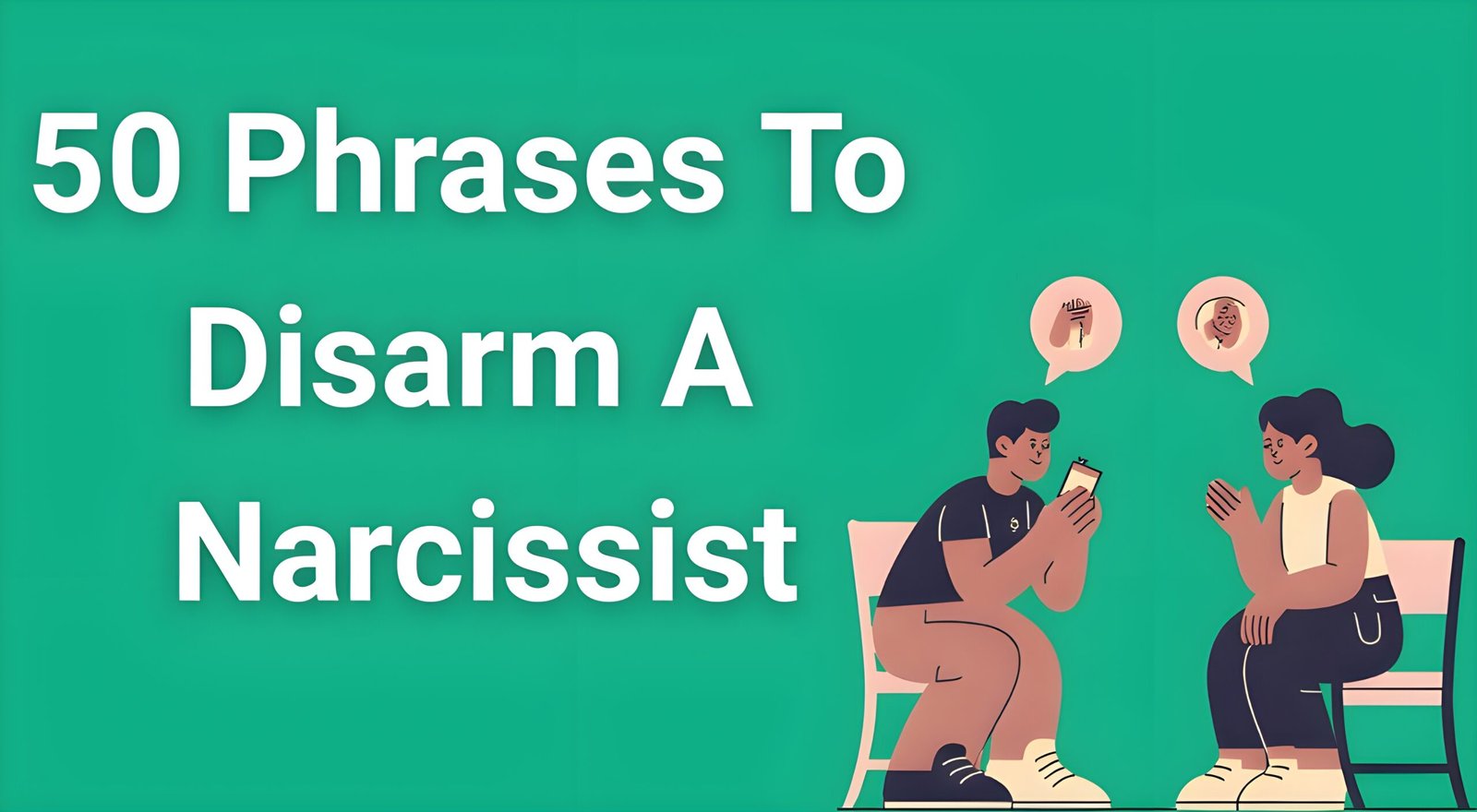I need to start with the truth: 50 phrases to disarm a narcissist won’t fix your relationship, change their behavior, or make them love you properly. But if you’re searching for phrases to disarm a narcissist, I understand why. You’re likely trapped—financially, legally, or logistically—with someone whose narcissistic behavior is destroying your peace, and you’re desperately looking for ways to survive the daily emotional warfare.
- The Dangerous Myth Behind “Disarming” a Narcissist
- When These Phrases Actually Matter
- The Proven Phrases To Disarm A Narcissist : Organized by Situation and Safety Level
- The Critical Safety Warnings Nobody Else Tells You
- Why This Question Reveals You Need an Exit Plan
- Moving Beyond Survival Mode
- The Healing That Awaits You
- The Truth About “Disarming” vs. Healing
- Your Next Steps: From Survival to Freedom
- Frequently Asked Questions About Phrases To Disarm A Narcissist
After seven years of helping survivors escape narcissistic relationships, I’ve learned that people don’t search for “disarming” techniques because they want to stay forever. They search because they need immediate survival tools while they plan their exit, protect their children, or wait for circumstances to change. This article provides those tools—but with the safety warnings and therapeutic context that most “phrase lists” dangerously omit.
Let me be clear from the start: these 50 phrases to disarm a narcissist male or female are temporary survival strategies, not permanent solutions. Think of them as emotional armor while you’re planning your escape, not tools to build a healthy relationship. Because here’s what seven years in this field has taught me: you cannot relationship your way out of abuse.
The Dangerous Myth Behind “Disarming” a Narcissist
Before I share these phrases, you need to understand why most lists of “50 key phrases to disarm a narcissist” are not just ineffective—they’re potentially dangerous. Recently i wrote about how to talk to a narcissist where i mentioned all the reasons why communication with narcissist isn’t normal.
Why This Search Reveals Your Trauma State
When you’re googling phrases to “disarm” someone, you’ve already accepted a fundamentally toxic premise: that your safety depends on managing another person’s emotions and reactions. This isn’t love—it’s survival mode. You’ve become so focused on preventing their explosions, avoiding their rage, and navigating their moods that you’ve lost sight of a crucial truth: healthy relationships don’t require disarming techniques.
Think about it. Do you search for phrases to “disarm” your healthy friends, coworkers, or family members? Of course not. You only need tactical responses when you’re living with someone unpredictable, volatile, and emotionally dangerous.
The False Promise of Control
Most articles about 50 phrases to disarm a narcissist sell you a seductive lie: that you can control their behavior through careful word choices. This feeds into the trauma bond by giving you hope that if you just say the right thing, respond perfectly, or manage them skillfully enough, they’ll treat you better.
But here’s what happens in reality:
- They adapt to your new responses and escalate their tactics
- They punish you for “getting too smart” about their manipulation
- They withhold affection longer to break down your newfound boundaries
- They recruit others to reinforce their narrative about your “difficult” behavior
You end up in an exhausting game of psychological chess where they always have the advantage because they’re not playing by the same rules of human decency that you are.
When These Phrases Actually Matter
Despite the problems with the concept, there are legitimate times when having strategic responses can protect your mental health and physical safety:
Financial Entrapment: When you’re financially dependent and need time to build resources for independence
Child Custody Concerns: When leaving immediately could jeopardize your relationship with your children
Legal Complications: When you’re navigating divorce proceedings or other legal matters
Safety Planning: When you’re developing a safety plan with professionals and need time to implement it
Medical Situations: When health crises prevent immediate separation
Family Business Entanglements: When shared professional obligations require continued interaction
If you’re in any of these situations, the following phrases can help you minimize psychological damage while you work toward freedom. But remember: these are band-aids on a severed artery. They might slow the bleeding, but they won’t heal the wound.
The Proven Phrases To Disarm A Narcissist : Organized by Situation and Safety Level
Phase 1: Gray Rock Fundamentals (Phrases 1-15)
The Gray Rock method involves becoming as boring and unresponsive as possible to reduce your value as a source of narcissistic supply. These phrases help you disengage without triggering immediate escalation:
1. “I understand you feel that way.” Purpose: Acknowledges without agreeing or arguing
2. “That’s an interesting perspective.” Purpose: Non-committal response that ends discussion
3. “I’ll have to think about that.” Purpose: Buys time and deflects immediate demands
4. “I can see this is important to you.” Purpose: Validates their sense of importance without engagement
5. “I’m not sure I have an opinion on that.” Purpose: Removes you as a debate opponent
6. “Maybe you’re right.” Purpose: Deflates argument without full agreement
7. “I hadn’t considered it from that angle.” Purpose: Flatters their “insight” while ending discussion
8. “That’s something to think about.” Purpose: Vague agreement that leads nowhere
9. “I can understand why you’d see it that way.” Purpose: Validates perspective without adopting it
10. “It sounds like you’ve given this a lot of thought.” Purpose: Compliments their thinking without engaging content
11. “I’m not the best person to discuss this with.” Purpose: Removes yourself from their preferred dynamic
12. “I don’t really have strong feelings about it either way.” Purpose: Removes emotional investment they can exploit
13. “You seem to know more about this than I do.” Purpose: Feeds ego while avoiding debate
14. “I’m still processing what you said earlier.” Purpose: Delays response when overwhelmed
15. “I’m not sure what you’d like me to say to that.” Purpose: Forces them to clarify rather than assume
Phase 2: Boundary Setting Without Confrontation (Phrases 16-30)
These responses establish limits while avoiding direct challenges that might trigger narcissistic rage:
16. “I need some time to think before I respond to that.” Purpose: Creates space when pressured for immediate reactions
17. “I understand this is frustrating for you, but I’m not able to discuss it right now.” Purpose: Sets boundary while acknowledging their feelings
18. “I can see we view this differently.” Purpose: Acknowledges difference without trying to resolve it
19. “I’m going to step away from this conversation for now.” Purpose: Exit strategy when things escalate
20. “I don’t think continuing this conversation will be productive.” Purpose: Ends circular arguments professionally
21. “I’d prefer to focus on [specific topic] right now.” Purpose: Redirects without refusing to engage entirely
22. “I’m not comfortable making that decision under pressure.” Purpose: Protects against coercive tactics
23. “I need to check my calendar before committing to anything.” Purpose: Buys time and creates accountability trail
24. “That’s not something I can agree to right now.” Purpose: Sets boundary without saying never
25. “I’ll need to consider all my options before deciding.” Purpose: Maintains autonomy over decisions
26. “I understand you’d like an answer now, but I need more time.” Purpose: Resists pressure tactics
27. “I’m not ready to discuss that topic yet.” Purpose: Controls conversation timing
28. “I can hear that you’re upset, but I need us to lower our voices.” Purpose: Addresses volume without addressing content
29. “I think we should revisit this when we’re both calmer.” Purpose: Postpones heated discussions
30. “I’m going to take some time to cool off before we continue.” Purpose: Self-care boundary disguised as mutual benefit
Phase 3: Managing Accusations and Gaslighting Phrases(Phrases 31-40)
When they’re actively distorting reality or making false accusations, these responses protect your sanity:
31. “I remember it differently, but I respect that you see it your way.” Purpose: Maintains your reality without direct confrontation
32. “We seem to have different recollections of that conversation.” Purpose: Acknowledges discrepancy without calling them liars
33. “I understand you feel strongly about this, but my experience was different.” Purpose: Validates feeling while protecting your truth
34. “I can see why you might interpret it that way.” Purpose: Allows their interpretation without adopting it
35. “That’s not how I intended it, but I understand you experienced it differently.” Purpose: Clarifies intent while validating impact
36. “I hear what you’re saying, but I need to trust my own experience.” Purpose: Politely maintains your reality
37. “We may never agree on this, and that’s okay.” Purpose: Accepts disagreement as acceptable outcome
38. “I can accept that we see this situation very differently.” Purpose: Reduces need to convince or be convinced
39. “I notice we have different perspectives on what happened.” Purpose: Neutral observation without judgment
40. “I understand this is your truth, and I have mine.” Purpose: Allows dual realities without conflict
Phase 4: De-escalating Rage and Threats (Phrases 41-50)
WARNING: These phrases are for when you cannot physically leave and need to lower immediate danger. If you feel unsafe, prioritize your physical safety over any verbal technique.
41. “I can see this is really affecting you.” Purpose: Acknowledges impact without taking responsibility
42. “I never intended to upset you this much.” Purpose: Reduces blame without admitting wrongdoing
43. “Help me understand what would make this better.” Purpose: Redirects rage toward problem-solving
44. “I want to work together to resolve this.” Purpose: Appeals to partnership rather than opposition
45. “What would you need from me right now?” Purpose: Gives them control while gathering information
46. “I can hear that you’re in pain about this.” Purpose: Reframes anger as hurt (safer emotion)
47. “This seems really important to you, and I want to understand.” Purpose: Validates importance while requesting explanation
48. “I don’t want us to hurt each other with our words.” Purpose: Appeals to mutual care
49. “Can we find a way to talk about this that works for both of us?” Purpose: Collaborative framing
50. “I care about you and don’t want this to damage our relationship.” Purpose: Last resort appeal to preservation instinct
The Critical Safety Warnings Nobody Else Tells You
When These Phrases Make Things Worse
50 phrases to disarm a narcissist can backfire spectacularly if:
They realize you’re using “techniques” on them. Narcissists hate feeling managed or manipulated, even when their behavior demands it. If they catch on that you’re using strategic responses, they may escalate dramatically.
You use them during narcissistic rage. When they’re in full rage mode, no phrase will “disarm” them. Your priority should be physical safety, not verbal de-escalation.
You mistake temporary calm for permanent change. Just because a phrase works once doesn’t mean they’re improving. Don’t let successful de-escalation fool you into believing they’re changing.
You start to believe you can control their behavior. The moment you think you’ve found the “magic words,” you’ve fallen back into the trauma bond.
Escalation Warning Signs
Stop using any of these phrases and prioritize your safety if you notice:
- Increased surveillance of your activities
- Threats toward you, your children, or pets
- Destruction of your property
- Attempts to isolate you from support systems
- Financial abuse or control escalating
- Sexual coercion or assault
- Stalking behaviors
- Substance abuse increasing their volatility
Why This Question Reveals You Need an Exit Plan
Here’s what I really want you to understand: the fact that you’re searching for 50 key phrases to disarm a narcissist means you’ve already accepted that normal human communication doesn’t work with this person. You’ve adapted to living with someone so unpredictable and volatile that you need tactical responses just to navigate daily life.
This is not normal. This is not love. This is survival.
The Real Solution Isn’t Better Phrases
While these phrases can provide temporary relief, the only real solution to narcissistic abuse is removing yourself from the narcissistic environment. Here’s why:
Narcissistic behavior is not a communication problem that better phrases can solve. It’s a personality disorder characterized by fundamental deficits in empathy, grandiosity, and emotional regulation. No combination of words will address these core issues.
Every technique you develop to “manage” them reinforces the dynamic that their behavior is acceptable as long as you can cope with it. This keeps you trapped in an increasingly smaller world of acceptable responses while they maintain complete freedom to act however they please.
The mental energy you’re spending on crafting perfect responses could be channeled toward building independence, gathering resources, and planning your freedom.
Moving Beyond Survival Mode
If you’re ready to shift from surviving to thriving, here’s how to start:
Document Everything
Start keeping a private record of incidents, conversations, and patterns. This serves multiple purposes:
- Helps you remember reality when they gaslight you
- Provides evidence for legal proceedings if needed
- Shows you the true pattern of their behavior
- Validates your experiences for therapeutic work
If you’re still questioning whether what you’re experiencing truly constitutes abuse or if you’re “overreacting,” my Narcissistic Abuse Clarity Report can help you understand your situation objectively and provide a roadmap for next steps.
Build Your Support Network Quietly
Narcissists typically isolate their victims, so rebuilding connections may need to happen gradually:
- Reconnect with old friends through “innocent” social media interactions
- Join groups or activities that give you regular contact with healthy people
- Develop relationships with neighbors, coworkers, or community members
- Consider online support groups if in-person meetings aren’t safe
Develop Financial Independence
Financial control is one of the primary ways narcissists keep victims trapped:
- Open a separate bank account if safe to do so
- Slowly build emergency funds in small amounts they won’t notice
- Understand your financial rights and assets
- Consider career development that increases your earning potential
- Research local resources for financial assistance during transitions
Create a Safety Plan
Work with domestic violence professionals to develop a comprehensive safety plan that includes:
- Safe places to go in an emergency
- Important documents stored securely outside the home
- A communication plan with trusted friends or family
- Resources for immediate needs (shelter, legal aid, counseling)
For those who can’t leave immediately but need concrete strategies to protect their mental health and plan their eventual exit, my guide “How to Survive When You Can’t Leave Yet” provides detailed, practical steps for this challenging transition period.
The Healing That Awaits You
I want to paint a picture of what life looks like when you no longer need 50 phrases to disarm a narcissist because narcissists are no longer part of your daily experience:
You wake up without immediately scanning for mood indicators or signs of trouble. You express your opinions without mentally preparing for an argument. You make plans without wondering if they’ll be sabotaged. You invest energy in your own goals rather than managing someone else’s emotions.
Your nervous system begins to calm. Your creativity returns. Your sense of humor emerges. You remember who you were before you became a hostage negotiator in your own home.
The Recovery Journey
Healing from narcissistic abuse is not linear, and it’s not quick. Even after you leave, you may find yourself:
- Second-guessing your decisions
- Missing the intensity of the relationship
- Feeling guilty for “abandoning” them
- Struggling with hypervigilance in new relationships
- Processing complex trauma responses
This is all normal. Recovery is possible, and you deserve support throughout this process.
Breaking trauma bonds and rebuilding your sense of self requires structured, daily work. My “30 Day Trauma Bond Recovery Workbook” provides the framework many survivors need to systematically address the psychological aftermath of narcissistic abuse and begin building healthier relationship patterns.
The Truth About “Disarming” vs. Healing
At the beginning of this article, you were looking for 50 phrases to disarm a narcissist. By now, I hope you understand that the real question isn’t “How do I disarm narcissist?” but “How do I protect myself while I plan my freedom?”
These phrases can serve as temporary tools, but they’re not solutions. They’re tourniquets—useful for stopping immediate bleeding, but they can’t heal the underlying wound.
The healing begins when you stop trying to manage their behavior and start focusing on reclaiming your life. It begins when you stop asking “What should I say?” and start asking “What do I deserve?”
You deserve relationships where you never need to google “disarming techniques.” You deserve love that doesn’t require tactical responses. You deserve peace that doesn’t depend on perfect phrase choices.
Your Next Steps: From Survival to Freedom
If you’re ready to move beyond survival tactics toward genuine healing and freedom:
- Acknowledge the Reality: Accept that needing these phrases means the relationship is fundamentally unhealthy
- Document Your Experience: Start keeping private records of incidents and patterns
- Build Your Resources: Quietly develop financial independence and support networks
- Get Professional Support: Work with therapists who understand narcissistic abuse
- Create Your Safety Plan: Develop comprehensive plans for various scenarios
- Trust Your Timeline: Move toward freedom at a pace that prioritizes your safety
Remember: You didn’t end up in this situation because you’re weak, foolish, or deserving of abuse. Narcissists are skilled at targeting caring, empathetic people and slowly eroding their reality through sophisticated psychological manipulation.
The fact that you’re reading this article means you still have the strength to fight for your freedom. You still have the wisdom to recognize that this isn’t how love should feel. You still have the courage to consider that you deserve better.
That strength, wisdom, and courage will carry you to safety. But first, you have to believe that you deserve to be free.
Frequently Asked Questions About Phrases To Disarm A Narcissist
Temporarily, some phrases can reduce immediate conflict or prevent escalation. However, they don’t change narcissistic behavior long-term and often backfire once the narcissist realizes they’re being “managed.” These phrases are survival tools, not relationship solutions.
No. Narcissistic personality patterns are deeply ingrained and resistant to change regardless of how others communicate with them. Using strategic phrases may temporarily modify their responses but won’t create lasting personality transformation or genuine empathy.
During active narcissistic rage, prioritize physical safety over verbal techniques. These phrases work best during lower-intensity interactions. If someone is in full rage mode, remove yourself from the situation if possible rather than trying to de-escalate verbally.
This guilt often stems from healthy relationship conditioning—in normal relationships, strategic communication feels manipulative. However, when you’re protecting yourself from psychological abuse, these techniques are legitimate self-defense, not manipulation.
These phrases are meant for temporary protection while you plan your exit, not as permanent relationship management tools. If you’re using them regularly, it indicates the relationship dynamics are unhealthy and unlikely to improve without professional intervention.
Yes, but covert narcissists may be more subtle in their responses and harder to read. They might appear to accept your boundaries while undermining you in passive-aggressive ways. The same safety principles apply—these are survival tools, not solutions.
If strategic responses increase their controlling behavior, it may indicate escalation risk. This is when professional safety planning becomes crucial. Their increased suspicion suggests they’re losing control, which can be a dangerous time for victims.
Remember: Your safety and well-being matter more than any relationship. If you’re in immediate danger, contact emergency services. For ongoing support, reach out to domestic violence resources in your area. You deserve love that doesn’t require survival techniques.





